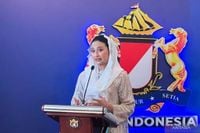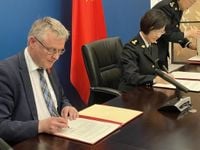In early April 2025, the harvest of early bulb onions in Uzbekistan was reported, marking the beginning of a key export season for the country. By April 15–20, 2025, export-ready volumes and retail-quality produce were expected to be available on the domestic market. As anticipated, the export season for Uzbekistan’s new onion crop commenced right on schedule, according to experts from EastFruit.
Nodirbek Musaev, head of the major export company Musaevs AgriFoods LLC, confirmed that shipments of the first small batches of the new season’s onions began about a week ago, around April 26, 2025. "Current export prices for Uzbekistan’s new harvest onions are at 40–45 US cents per kilogram on FCA terms, which is approximately double the price compared to the same period last year," he stated. Despite the elevated prices, major Russian and Belarusian retailers issued tenders for the supply of Uzbek onions at the end of last week and the beginning of this week. Musaev expressed optimism, noting, "We can likely expect the start of large-scale exports within a week to ten days."
The primary reason for the high prices of Uzbekistan’s new-season onions is the significant reduction in the area planted with winter onions during August and September of the previous year. The harvest of those crops began in the second half of March 2025. In the first quarter of 2025 alone, Uzbekistan exported 64.6 thousand tonnes of bulb onions worth $14.4 million, underscoring the importance of this crop to the country's economy.
Meanwhile, on the international trade front, Indonesia is diversifying its export markets. On Friday, April 25, 2025, Deputy Minister Putri stated that the government is actively expanding cooperation through several trade agreements, such as the Comprehensive Economic Partnership Agreement (CEPA) and Free Trade Agreement (FTA) with various countries. These efforts are aimed at increasing market access for Indonesian products with high competitiveness on the international stage.
Putri highlighted that the destination countries for these exports include Australia, South Korea, the African region, and the Middle East. "These are non-conventional trading partners, but we see the potential in this market," she added. Currently, Indonesia boasts 21 trade agreements with different partner countries and has 16 additional agreements under negotiation to further enhance national export opportunities.
Among these agreements, the Indonesia-Canada CEPA is particularly notable, as it has the potential to provide access to a market of 51 million people and a gross domestic product (GDP) worth US$2.2 trillion for halal-certified products. Putri remarked, "The halal industry is a big one and has great potential for Canada." Additionally, she noted that President Pabowo Subianto and Peruvian President Dina Ercilia Boluarte Zegarra have announced the substantial completion of the Indonesia-Peru CEPA, which will facilitate increased exports of products such as palm oil, rubber, pharmaceuticals, and textiles.
Furthermore, the Indonesian government is pushing for the completion of a trade agreement with the European Union, which has a GDP value of US$18.6 trillion. Indonesia's commitment to the Paris Agreement also supports this cooperation, as the country seeks to expand exports of sustainable products, including furniture, textiles, and new and renewable energy technology. "We do have a sustainable market in the European Union. The government has carried out many efforts to open access for a sustainable future," Putri concluded.
In Thailand, Prime Minister Paetongtarn Shinawatra convened a meeting to address growing concerns over “origin fraud,” the practice of falsely labeling goods as Thai to secure trade benefits. Representatives from the Ministry of Commerce, the Customs Department, the Federation of Thai Industries, and the Thai Chamber of Commerce gathered recently to discuss stricter enforcement of rules governing Certificates of Origin, which are essential for maintaining the credibility of Thai exports.
The Department of Foreign Trade will lead short-term efforts, including consultations with US Customs and Border Protection, to establish new criteria for issuing origin certificates. Monitoring will be expanded to 65 product categories across 224 tariff codes, with a focus on preventing non-compliant products from entering global markets under Thai branding. The Thai government plans to introduce legal reforms that will impose tougher penalties on companies found guilty of origin fraud.
Prime Minister Shinawatra expressed confidence that tighter verification and oversight would reduce fraudulent claims within 90 days from April 26, 2025. This initiative aims to create greater opportunities for legitimate Thai exporters, especially small and medium-sized enterprises, to compete internationally on fair terms. The government is working to increase the presence of genuine Thai products and materials in foreign markets, supporting both trade growth and Thailand’s global standing.
Lastly, Denmark has strengthened its food trade with China through three new export protocols signed during the visit by Denmark’s Minister for Food, Agriculture and Fisheries, Jacob Jensen, to Beijing on April 21-22, 2025. The agreements cover malting barley, horse feed, and wild-caught aquatic products. Notably, the protocol for wild-caught fish removes the need for species-specific approvals, allowing all wild-caught fish, seafood, and other aquatic products from Denmark and Greenland to enter the Chinese market under a single agreement.
Fish and seafood have become Denmark’s largest food export to China, accounting for 35% of the total in 2024. Minister Jensen expressed satisfaction with the agreements, stating, "I am pleased to have signed three important agreements with China on horse feed, malting barley, and wild-caught fish, which undoubtedly will be of great significance for Danish and Greenlandic food exports to China." He emphasized the potential for exports to grow even further, benefiting both Danish and Greenlandic businesses.
These developments highlight the dynamic landscape of international trade as countries adapt to changing market conditions and seek new opportunities. From Uzbekistan's onion exports to Indonesia's diversification of trade partners and Thailand's efforts to combat origin fraud, the global marketplace is continually evolving, presenting both challenges and opportunities for nations around the world.





